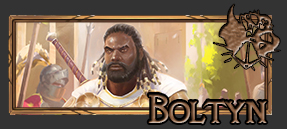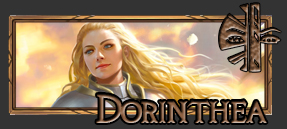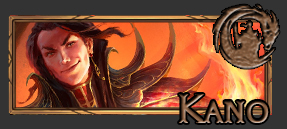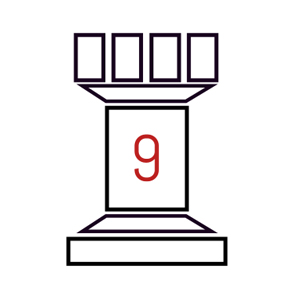
It’s an intense game of Flesh and Blood. Both players are getting low on life, but you’re a little behind on tempo. Your opponent is playing Boltyn and their next turn isn’t that big- all they do is make a single charge attack and arsenal a card. This could be your opportunity!
You block with a single card and mount a big attack of your own; the opponent blocks with armor only, dropping all the way to one life!
It looks like you’re close to the win, but next turn the opponent uses an Energy Potion to play a V of the Vanguard (double charge) for five, followed by using Boltyn’s ability to give it go again and then a Raydn attack for another five. You block up, only to be hit by a red Valiant Thrust for nine more damage! Your only option is to block with the rest of your hand to avoid death… but the opponent then uses Boltyn’s ability again and spends the remaining resource to play the last card in Arsenal: a second Valiant Thrust for another nine damage!
With nothing left to defend yourself with, that’s it. You might have been able to get your opponent down to one life, but the opponent let that happen in service of a huge closer!

Both players are on just one life, but you have the tempo advantage. Your opponent, a Dorinthea player, is dumping their whole hand every turn in order to avoid dying to your attacks. They aren’t even able to get weapon swings in! Victory seems inevitable; sooner or later the opponent is going to fatigue out.
However, after several turns of this, the opponent doesn’t block one of your attacks. Did they finally run out of cards that can block? No; they throw a defense reaction- it’s a Steelblade Shunt- and you have no way to gain life or prevent the damage! Despite seeming on the back foot, the Dorinthea player has prevailed!

You’re playing against Kano and get him down to one life. On your next turn, you have a very strong attack ready to try and finish the game- but before your attack can resolve, Kano manages to use his ability and his Storm Striders to play several cards at instant speed, ultimately killing you on your own turn!
What do all of these scenarios have in common? A close life total did not necessarily mean that the game was actually close.
In order to improve at Flesh and Blood, it can be useful to distinguish between games that are legitimately close and ones that are close on paper only. An old adage in Magic: the Gathering says, “only the last point of life matters.” to put things another way, a victory with one point of life remaining is the same as a victory with forty points of life remaining.
A victory with one point of life remaining is the same as a victory with forty points of life remaining.
Because experienced players know this, they may well be willing to take a lot of damage- even dropping to one life- if doing so will allow them to make an unstoppable attack. As a result, even if you dropped an opponent to one life, that does not mean that you were necessarily that close to winning. It might well be that your opponent easily could have blocked more, but chose not to do so in order to close out the game more quickly.


Similarly, if you consider the Steelblade Shunt scenario, an opponent that looks like they might be “on the ropes” could, in fact, have you right where they want you. If a player knows they have something that will close out the game and they just need to draw into it, they can afford to dump their whole hand on defense while trying to wait things out. I’ve often seen this happen with Steelblade Shunt or Reckless Swing, since these cards inflict damage that many decks cannot prevent; but there are other situations where other cards might similarly be “game-winners”. Dominate cards are another example, acting as powerful finishers against opponents low on life, armor, and other outs. Just because you have the tempo advantage doesn’t necessarily mean you’re in the lead; the opponent may just be waiting for their winning card!

Kano in particular is kind of a special case, in that his ability to do major damage at instant speed means that he can drop to a very low life total and still threaten victory. It’s common in my experience to have games- especially in Blitz- where it becomes evident that either Kano or his opponent is going to die in a given turn, but it isn’t clear which one! Games against Kano are very often close, even if they don’t look like it at first glance; even if the non-Kano player wins ten to zero, it may well be that a slightly better draw from Kano could have led to a lethal combo!
These properties mean that it’s important not just to consider the relative life totals or who currently has the tempo advantage, but also other, deeper aspects of the game: pitch stacking, fatigue, etc. Flesh and Blood is a deep game, and just looking at life totals can be kind of surface-level.
Another area where games can appear closer than they actually are is 'draw luck'. In some cases, a player might have set up the bottom of their deck by pitching certain cards in an order that would allow them to play out a combo once the deck comes back around to the cards they pitched. To a player that’s unfamiliar, that might look like a lucky draw, or 'topdecking'- but to the expert, they might have been planning on that “lucky draw” for turns and turns!
That said, deceptively close-looking life totals are in some ways a favorable property when it comes to the new player experience, as it helps people feel like they are doing better than they are. Broadly speaking, Flesh and Blood is a very low-variance game when compared to many other card games. I have played other low-variance card games before- many of FFG’s competitive LCG offerings are in this category- and some of those suffered from having a very harsh experience when a new player was pitted against an experienced one, where a game would be blatantly one-sided. By contrast, in FAB a newer player might lose to a veteran but still feel like they were doing pretty well in terms of overall life totals, even if the game wasn’t really that close.
While this can be a favorable factor for player retention, if your goal is to improve it’s important to move past it. Don’t give yourself excuses! Look carefully at how your defeats went, and don’t be too quick to call them unlucky losses or close games- it’s easy to fool yourself, and thereby slow down your improvement. That doesn’t mean no game is ever close, but you should be able to distinguish between an actual close game and one that’s only close in life total- not close in result.




